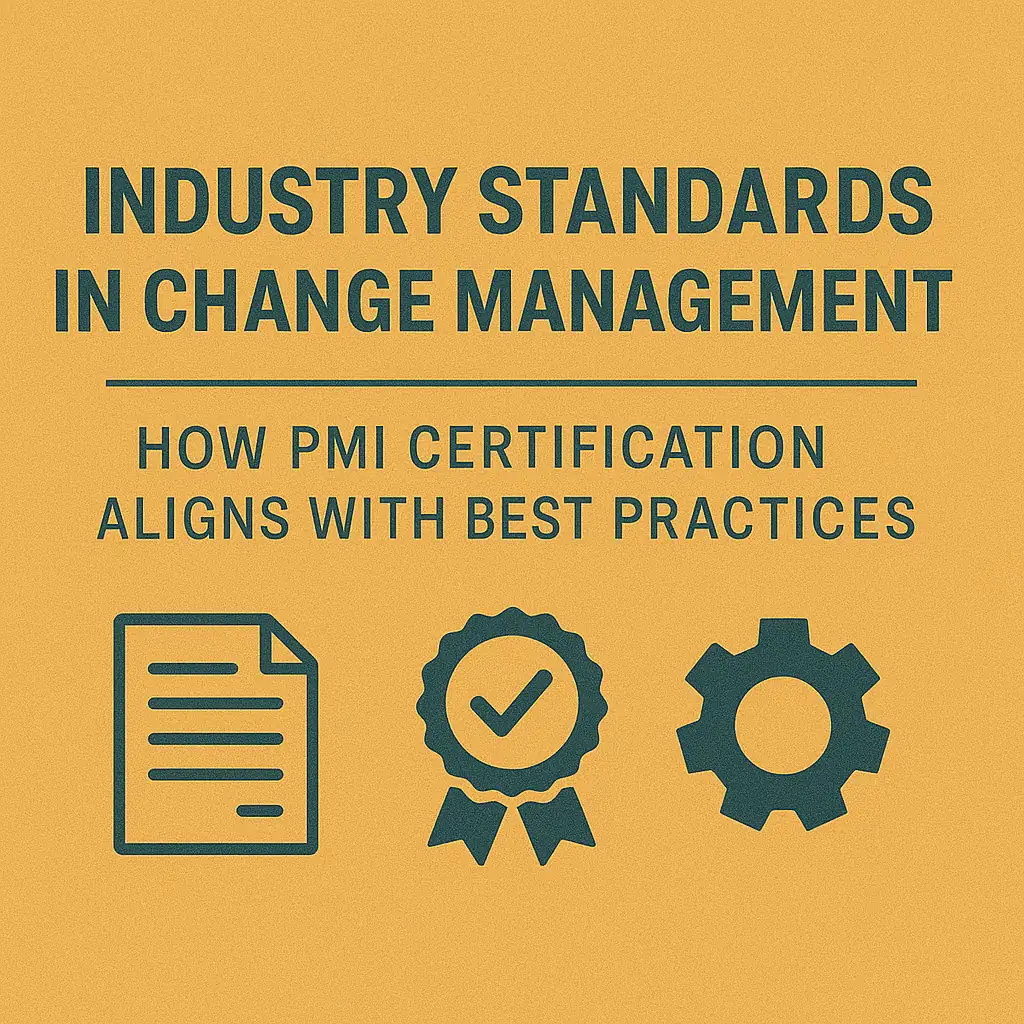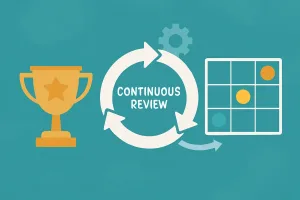Introduction
Change management is a critical discipline within project management that focuses on guiding organizations through transitions, ensuring that changes are implemented smoothly and effectively. It involves applying knowledge, tools, and techniques to manage the human, structural, and cultural aspects of change, ultimately aiming to achieve desired outcomes while minimizing resistance and disruption. In the context of project management, change management is essential for aligning project objectives with organizational goals, thereby enhancing the likelihood of project success [2][4].
The Project Management Institute (PMI) is a globally recognized organization dedicated to advancing the profession of project management. PMI sets industry standards and best practices, providing resources and certifications that equip professionals with the skills necessary to excel in their roles. One of the key certifications offered by PMI is the Change Management Certification, which is designed to prepare individuals to lead and manage change initiatives effectively within their organizations. This certification not only validates a professional’s expertise in change management but also aligns with global standards, ensuring that practitioners are equipped to meet the evolving demands of the industry [1][10].
Certification plays a vital role in maintaining adherence to industry standards, particularly in fields like project management where the stakes are high. By obtaining PMI certification, professionals demonstrate their commitment to best practices and their ability to navigate the complexities of change management. This is especially important for compliance officers and quality managers, who must ensure that their organizations adhere to regulatory requirements and maintain high standards of quality throughout the change process. The PMI certification serves as a benchmark for excellence, providing assurance to stakeholders that certified professionals possess the necessary knowledge and skills to manage change effectively [3][7].
Understanding Change Management
Change management focuses on preparing, supporting, and helping individuals and organizations in making organizational change. It encompasses a structured approach to transitioning individuals, teams, and organizations from a current state to a desired future state. Here are the key components and insights into change management, particularly in relation to the Project Management Institute (PMI) certification.
Key Components of Change Management
- Planning: This initial phase involves assessing the needs of the organization and its stakeholders. It is essential to define the change approach and align it with the organizational culture. Various models, such as Bridges, Lewin, and Kotter, can be utilized to guide this process, emphasizing that there is no one-size-fits-all solution [1][2].
- Implementation: This stage focuses on executing the change plan. It requires effective communication and engagement with stakeholders to ensure that everyone understands the changes and their roles in the process. A combination of project management and change management practices can help mitigate potential risks associated with the transition [6][10].
- Monitoring: After implementation, it is crucial to monitor the progress of the change initiative. This involves tracking key performance indicators and gathering feedback from stakeholders to assess the effectiveness of the change [5].
- Review: The final component is to review the outcomes of the change initiative. This includes evaluating what worked well and what did not, allowing organizations to learn from their experiences and improve future change management efforts [15].
The Role of Change Management in Minimizing Project Risks
Effective change management plays a vital role in minimizing project risks. By integrating change management strategies with project management practices, organizations can enhance their ability to manage stakeholder expectations and reduce resistance to change. Studies have shown that organizations that adopt formal change management practices achieve higher success rates in their projects [10][11]. This integration ensures that potential negative impacts of change are identified and addressed proactively, leading to smoother transitions and better project outcomes [6][8].
Real-World Examples of Successful Change Management Practices
Several organizations have successfully implemented change management practices that align with PMI standards, demonstrating the effectiveness of structured approaches:
- Case Study 1: A multinational corporation faced significant resistance when implementing a new software system. By employing a structured change management strategy that included stakeholder engagement and training, the organization was able to achieve a 90% adoption rate within the first month of implementation.
- Case Study 2: A healthcare provider underwent a major organizational restructuring. By utilizing change management frameworks, they effectively communicated the reasons for the change and involved employees in the process, resulting in a smoother transition and improved employee morale.
These examples illustrate how adhering to change management principles can lead to successful outcomes, reinforcing the importance of PMI certification in equipping professionals with the necessary skills to lead such initiatives effectively [11][14].
Overview of PMI Change Management Certification
The Project Management Institute (PMI) offers a Change Management Certification designed to equip professionals with the necessary skills and knowledge to effectively manage and lead change initiatives within organizations. This certification aligns with global standards and best practices in project management, making it a valuable asset for compliance officers and quality managers.
Description of PMI’s Change Management Certification Program
PMI’s Change Management Certification focuses on the principles and practices essential for successful change management. It emphasizes the integration of change management with project management, ensuring that professionals can navigate the complexities of organizational change effectively. The program is structured to provide a comprehensive understanding of change management methodologies, tools, and techniques that are critical in today’s dynamic business environment [4][9].
Eligibility Criteria and Application Process
To be eligible for the PMI Change Management Certification, candidates typically need to meet specific educational and professional experience requirements. While the exact criteria may vary, applicants generally should have:
- A secondary degree (high school diploma, associate’s degree, or global equivalent) with at least 5,000 hours of leading and directing projects and 35 hours of project management education, or
- A four-year degree with at least 3,500 hours of leading and directing projects and 35 hours of project management education.
The application process involves submitting proof of eligibility, completing the required education, and passing the certification exam. This structured approach ensures that certified professionals possess a solid foundation in both project and change management practices [4][9].
Benefits of Obtaining PMI Certification for Compliance Officers and Quality Managers
For compliance officers and quality managers, obtaining the PMI Change Management Certification offers several significant benefits:
- Enhanced Credibility: Certification from a globally recognized organization like PMI enhances professional credibility and demonstrates a commitment to best practices in change management [4].
- Improved Change Management Skills: The certification program equips professionals with advanced skills to manage change effectively, which is crucial in ensuring compliance with regulations and maintaining quality standards [4][9].
- Alignment with Industry Standards: The certification aligns with global standards in project management, ensuring that certified professionals are well-versed in the latest methodologies and practices [4][9].
- Career Advancement Opportunities: Holding a PMI Change Management Certification can open doors to new career opportunities and advancement within organizations, as employers increasingly seek professionals with formal training in change management [4].
Global Standards in Change Management
In change management, adherence to global standards is crucial for ensuring effective practices and achieving desired outcomes. The Project Management Institute (PMI) has established itself as a leader in this field, providing certifications that align with international best practices. This section explores the significance of these standards, particularly focusing on PMI certification and its alignment with global frameworks.
Introduction to ISO Standards and Other International Frameworks
ISO (International Organization for Standardization) standards play a pivotal role in establishing a common framework for quality management and change management practices across various industries. These standards provide guidelines that organizations can follow to ensure consistency, efficiency, and quality in their processes. For instance, ISO 9001 focuses on quality management systems, while ISO 10006 provides guidelines for quality management in projects. These frameworks emphasize the importance of structured approaches to managing change, which is essential for compliance officers and quality managers.
In addition to ISO standards, other international frameworks such as the OGC’s Managing Successful Programmes (MSP) and the Association for Project Management (APM) Body of Knowledge also contribute to the landscape of change management. These frameworks offer methodologies and best practices that organizations can adopt to enhance their change management processes.
Comparison of PMI Guidelines with Global Standards in Change Management
PMI’s guidelines, particularly those outlined in the PMI Global Standard for Portfolio Management, provide a comprehensive framework for integrating change management into project management practices. This standard emphasizes the need for a structured approach to managing change, aligning closely with ISO standards and other international frameworks.
- Framework Integration: PMI’s approach to change management integrates organizational and individual change processes, which is a key aspect of effective change management as highlighted in ISO standards [2][6].
- Best Practices: PMI certifications, such as the Change Management Certification, equip professionals with the skills necessary to implement these best practices effectively. This certification is designed to align with global standards, ensuring that certified individuals are well-versed in both PMI guidelines and international frameworks [12].
By comparing PMI’s guidelines with ISO standards, it becomes evident that both emphasize the importance of structured methodologies, stakeholder engagement, and continuous improvement in change management practices. This alignment not only enhances the credibility of PMI certifications but also ensures that organizations adopting these practices are compliant with global standards.
The Importance of Aligning with Global Standards for Compliance and Quality Assurance
For compliance officers and quality managers, aligning with global standards in change management is essential for several reasons:
- Enhanced Credibility: Organizations that adhere to recognized standards, such as those set by PMI and ISO, demonstrate their commitment to quality and compliance. This can enhance their reputation and build trust with stakeholders [10].
- Improved Success Rates: Studies indicate that organizations employing standardized change management techniques achieve higher success rates in their projects. By integrating PMI’s structured approach with ISO standards, organizations can optimize their change initiatives, reducing redundancy and costs [10][11].
- Regulatory Compliance: Many industries are subject to regulatory requirements that mandate adherence to specific standards. By aligning with PMI and ISO guidelines, organizations can ensure they meet these compliance requirements, thereby mitigating risks associated with non-compliance [12].
How PMI Certification Aligns with Best Practices
The Project Management Institute (PMI) stands as a beacon of excellence, particularly in the field of change management. The PMI Change Management Certification is designed to equip professionals with the necessary skills and knowledge to effectively manage and lead change initiatives within organizations. This certification not only validates expertise but also aligns closely with global standards and best practices in change management.
Analysis of PMI’s Change Management Framework and Methodologies
PMI’s change management framework emphasizes a structured approach to managing change, focusing on the application of knowledge and tools to achieve desired outcomes. This framework integrates various methodologies that address the behavioral, structural, and cultural aspects of change, ensuring that organizations can navigate transitions smoothly. By aligning with established best practices, PMI’s framework provides a comprehensive guide for professionals to implement effective change management strategies that resonate with industry standards [10][11].
Case Studies Demonstrating Alignment with Industry Best Practices
Numerous organizations have successfully implemented PMI’s change management principles, showcasing the effectiveness of its methodologies. For instance, Duke Energy utilized proven best practices in organizational change management to engage sponsors and transform its operations. This case study illustrates how PMI’s structured approach can lead to significant improvements in organizational performance and stakeholder engagement [3]. Such examples highlight the practical application of PMI’s certification in real-world scenarios, reinforcing its alignment with industry best practices.
The Role of PMI Certification in Fostering a Culture of Continuous Improvement
PMI certification plays a crucial role in fostering a culture of continuous improvement within organizations. By equipping professionals with the tools and knowledge necessary to manage change effectively, the certification encourages a proactive approach to addressing challenges and seizing opportunities. This commitment to ongoing development not only enhances individual capabilities but also contributes to the overall resilience and adaptability of organizations in a rapidly changing business environment [10][12].
Benefits for Compliance Officers and Quality Managers
The Project Management Institute (PMI) Change Management Certification offers significant advantages for compliance officers and quality managers, particularly in aligning with global standards and best practices in change management. Here are the key benefits:
- Enhanced Ability to Implement and Oversee Change Management Processes: PMI’s Change Management Certification equips professionals with foundational theories and concepts of change management, including various models and principles. This knowledge enables compliance officers and quality managers to effectively implement and oversee change management processes within their organizations, ensuring that changes are managed systematically and efficiently [10].
- Improved Risk Management Capabilities Through Standardized Approaches: The certification emphasizes the establishment of standardized processes and tools that promote consistency and efficiency across projects. By adopting these standardized approaches, compliance officers and quality managers can enhance their risk management capabilities, allowing them to identify, assess, and mitigate risks associated with organizational changes more effectively [7][13].
- Increased Credibility and Recognition in the Field of Project Management: Obtaining PMI certification not only enhances an individual’s skill set but also significantly boosts their professional credibility. Stakeholders are more likely to trust projects led by certified professionals, which can lead to greater support and resources for compliance officers and quality managers in their initiatives [8][6]. This recognition is crucial in fostering a culture of compliance and quality within organizations, as it demonstrates a commitment to adhering to industry standards and best practices.
Conclusion
The PMI certification in change management plays a pivotal role in aligning professionals with global industry standards. Throughout this blog, we have explored several key points that highlight the significance of this certification:
- Standardization of Practices: PMI certification provides a structured framework that standardizes change management practices across organizations, ensuring that compliance officers and quality managers can effectively manage change with minimal disruption to operations [1][12].
- Enhanced Skills and Knowledge: The certification equips professionals with essential skills and knowledge that are critical for navigating the complexities of change within organizations. This includes understanding stakeholder engagement, risk management, and effective communication strategies [4][8].
- Career Advancement Opportunities: Obtaining PMI certification not only enhances an individual’s expertise but also opens doors to new career opportunities. It is increasingly recognized by employers as a benchmark for competence in change management, making certified professionals more competitive in the job market [7][12].
- Alignment with Best Practices: The PMI certification aligns with best practices in change management, ensuring that certified professionals are well-versed in the latest methodologies and tools that drive successful change initiatives [6][15].
Standardization of Practices: PMI certification provides a structured framework that standardizes change management practices across organizations, ensuring that compliance officers and quality managers can effectively manage change with minimal disruption to operations [1][12].
In conclusion, pursuing PMI certification is a valuable investment for compliance officers and quality managers seeking to advance their careers. It not only demonstrates a commitment to professional development but also positions individuals as leaders in change management within their organizations. By embracing this certification, professionals can enhance their ability to implement effective change strategies that align with industry standards, ultimately contributing to the success and agility of their organizations.
Find out more about Shaun Stoltz https://www.shaunstoltz.com/about/.
This post was written by an AI and reviewed/edited by a human.



